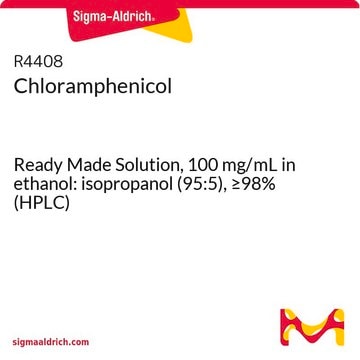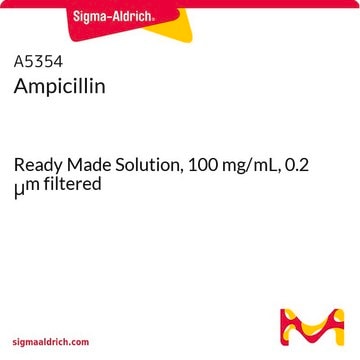220551
Chloramphenicol
Chloramphenicol, CAS 56-75-7, is a synthetic bacteriostatic antibiotic that inhibits the translation of RNA by blocking the peptidyltransferase reaction on ribosomes.
Sinónimos:
Chloramphenicol
About This Item
Productos recomendados
Quality Level
assay
≥97% (by Assay)
form
crystalline powder
manufacturer/tradename
Calbiochem®
storage condition
OK to freeze
color
gray to off-white
solubility
water: 2.5 mg/mL
methanol: 35 mg/mL
ethanol: soluble
shipped in
ambient
storage temp.
10-30°C
InChI
1S/C11H12Cl2N2O5/c12-10(13)11(18)14-8(5-16)9(17)6-1-3-7(4-2-6)15(19)20/h1-4,8-10,16-17H,5H2,(H,14,18)
Inchi Key
WIIZWVCIJKGZOK-UHFFFAOYSA-N
General description
Biochem/physiol Actions
trasnslation of RNA
Other Notes
Lu, J., and Jiang, C. 1993. Biochem. Biophys. Res. Commun.196, 12.
Saltarelli, M.J., et al. 1993. Virol.197, 35.
Holt, J.T. 1992. Ann. N.Y. Acad. Sci.660, 88.
Maniatis, T., et al. 1989. In Molecular Cloning, A Laboratory Manual, Second Edition. Cold Spring Harbor, NY, p. 1.6, A.6.
Legal Information
signalword
Danger
hcodes
Hazard Classifications
Carc. 2 - Eye Dam. 1 - Repr. 2
Storage Class
11 - Combustible Solids
wgk_germany
WGK 3
Certificados de análisis (COA)
Busque Certificados de análisis (COA) introduciendo el número de lote del producto. Los números de lote se encuentran en la etiqueta del producto después de las palabras «Lot» o «Batch»
¿Ya tiene este producto?
Encuentre la documentación para los productos que ha comprado recientemente en la Biblioteca de documentos.
Los clientes también vieron
Contenido relacionado
MILLIPLEX® genotoxicity assays enable high-throughput measurement of DNA damage, reducing time and cost.
MILLIPLEX® genotoxicity assays enable high-throughput measurement of DNA damage, reducing time and cost.
MILLIPLEX® genotoxicity assays enable high-throughput measurement of DNA damage, reducing time and cost.
MILLIPLEX® genotoxicity assays enable high-throughput measurement of DNA damage, reducing time and cost.
Nuestro equipo de científicos tiene experiencia en todas las áreas de investigación: Ciencias de la vida, Ciencia de los materiales, Síntesis química, Cromatografía, Analítica y muchas otras.
Póngase en contacto con el Servicio técnico










